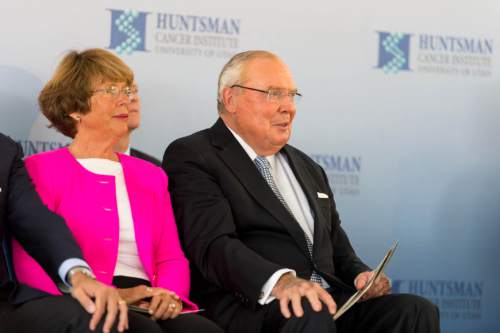This is an archived article that was published on sltrib.com in 2015, and information in the article may be outdated. It is provided only for personal research purposes and may not be reprinted.
Dozens of people throughout the country have received emails purportedly from Utah's richest man and most famous philanthropist promising millions of dollars as soon as they hand over their private banking information.
It's the Jon Huntsman Sr. scam, and it has tormented the man, his company and the cancer center that bears his name.
"We can confirm that no such emails have been sent by Mr. Huntsman or Huntsman Corporation," said Huntsman's personal assistant Pam Bailey, "and deeply regret that his good name and reputation are being used to prey on people in this way."
This phishing scam has dragged on for months and is being investigated by Huntsman Corp. information-technology experts in Houston, as well as federal investigators. The Huntsman Cancer Institute has a warning on its website.
And yet, the emails keep coming.
Diane Serra, of Buffalo, N.Y., received one Sept. 8, sent through an email address that appears to come from a substitute teacher in Tennessee. It said: "A donation has been awarded to you by Mr. Jon Huntsman Sr. for his on-going donation project tagged 'I WANT TO BE BROKE BY THE TIME I DIE.'"
It included a link to a news story about Huntsman and an email address she could contact for more information.
Serra, the owner of Caramici's Bakery, was immediately skeptical and yet a bit curious. She threw Huntsman's name into a search engine and learned that he is not only a real billionaire, who earned his money through his chemical business, but he has really said he wants to give away his fortune. And she had heard of his cancer institute, having seen Huntsman on a TV commercial.
She reached out to The Salt Lake Tribune and sent an email to the fake Huntsman account to get more information.
The response she received came from someone posing as Huntsman. It uses much of his history, saying he was born in Blackfoot, Idaho, and that his mother died from cancer. But it also identified him as a citizen of the United States and used stilted, ungrammatical English.
"I rose up from 0.4% poor to been a billionaire today, so I know what it means not to have anything at all," the email reads. "I feel like there is no use for all this wealth if others cannot benefit from it."
The email promises $2.3 million, as long as Serra would provide personal information.
"I knew it was bull," she said. "I thought billionaires don't just give their money to anybody."
Still, it was fun to dream.
"I would fly right to him and thank him personally," Serra said, "and I would bring a whole bunch of cannoli."
That's how phishing ventures like this and the famous Nigerian email scam work, preying on the dream of instant riches.
Francine Giani, executive director of the Utah Department of Commerce, has seen many similar frauds, but never one in which the con artists try to pass themselves off as a real person, particularly one whose personal story gives the email a hint of authenticity.
"This is a unique way to scam," she said. "He came from nothing, and he is OK with not having anything. It makes perfect sense, but clearly it is a scam."
Giani warns people against providing any personal information to people who contact them through email or over the phone.
mcanham@sltrib.com Twitter: @mattcanham



